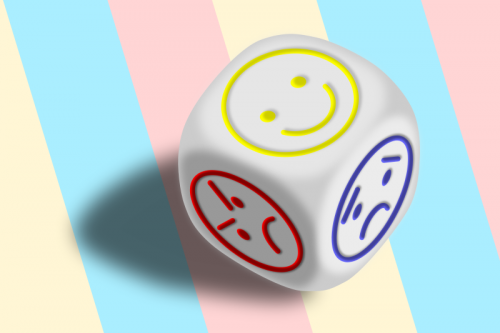A person with bipolar disorder has neurophysiological issues and is known to have severe mood swings. Mood swings can go from being joyful, mania, to sadness and depression. With the abnormal changes in behaviors, he can quickly get irritated that often leads him to be violent or depressed.

Source: commons.wikimedia.org
According to Romas Buivydas, PhD, LHMC, Vice President of Clinical Development at Spectrum Health Systems, “In many cases, drugs or alcohol are turned to for relief from the mental pain of depression. In others, depression develops as a result of the emotional and physical damage done by addiction,”
I’m Hurt Seeing My Child Getting Depressed
I let my child cope with her high moods by engaging her in activities that she likes, such as painting and doing other art stuff. But when it comes to her depressed state, it’s quite hard to soothe her tantrums, and managing her depression is never easy. I can say that this is the thing I hate most about my child’s bipolar illness.
Tantrums signal that depression is about to take charge. And according to my child’s therapist, there are things you can do to help boost your child’s mood so that it would not be a hard day for both you and your child.

Source: pixabay.com
- Patience Is A Virtue. Children with bipolar illness rarely stay in the pacified state, but you as a caregiver of a bipolar child must to keep your calm. Your patience will be tested by this cycling of moods, especially when she’s turning into this violent kid. In the case of my child, this often occurs in the morning or whenever something or someone disrupts her when she is busy doing something. So it is of importance that we just let her by herself for a moment so as not to cross the personal boundaries she had set.
- Help Your Kid Structure Her Day. Making a schedule chart for her can lessen depression. It includes setting time for eating and sleeping and other activities especially if she’s attending a regular school. It is essential to establish enough time for resting and relaxing because making her too busy and tired can also be a trigger for having tantrums. This method will help your kid set things in order and knowing she had accomplished something within the day as she crosses out tasks on her checklist is a natural mood booster.
- Enjoy Doing Activities With Your Child. People can sometimes become unfriendly especially if they know you have an illness, and your child may be one of those with very few friends. Take this as an opportunity to be her friend and know her more as you spend time with her. Be her buddy. Know her interests and be natural. Have fun with her doing pleasurable activities she enjoys. It will boost her mood, and even at times when she doesn’t feel she has the energy to do things, the idea of you doing things together might excite and motivate her.

Source: flickr.com
- Do Not Let Your Kid Isolate Herself. Encourage her to make friends and allow her to go out with a good set of friends from time to time. You can even set parties or simple get-togethers for them in your house, like popcorn and movie day or pool day.
The idea of joining a support group, especially for teens, can also be helpful. It will give your child the chance to be friends with others who have the same condition. They can talk about their experiences and can uplift each other’s mood.
“Some children’s reactions are just bigger than their peers or their siblings or their cousins. Not only do they feel things more intensely and quickly, they’re often slower to return to being calm.” – Lindsey Giller, PsyD
- Discipline Is What Your Kid Needs. Do not try to be controlling if you do not want to have a depressed child who rebels.
You can enforce boundaries and implement discipline in a way that will not stress her. Consequences, not punishment, for specific behaviors should be explained when they are in their calm state so that they can process it with clear minds.
Reinforce positive behaviors and reward your kid for these behaviors. This will allow them to develop a strong sense of character, affirming and complementing them on their excellent job and for doing the right thing. This kind of discipline is also a way of preparing them to face their future with the hope that they can manage their own mood cycling with emotional maturity.
- Be Your Child’s Support. Be more than just a caregiver who hands her medications. Be her friend and support. If you know that she is in a low mood, just assure her that you are there waiting for her and willing to help her get her enthusiasm back. And when she suddenly throws a violent outburst on you, try not to argue back for it will only cause frustration on both of you.

Source pxhere.com
Always listen with your heart, and not with your head. Remind yourself every day that your kid has a medical condition that requires special attention and a lot of understanding. She behaves like she does not because she wants to but because of her brain spiking adrenaline that gives her so much energy, making her stronger, shutting down her thinking process. Undeveloped emotional regulation causes her anxiety, irritability, fear, violent behaviors, tantrums, and depression. Therapists say that boosting your child’s mood will not prevent her from experiencing depression, but will lessen its negative effects on you and your kid.
“If your child exclaims, “I’m mad!” that’s already a step in the right direction of managing his strong feelings.” – Stephanie Samar, PsyD
No one will understand your child more than you do. Seeing a therapist yourself on a regular basis and being in a support group will help you a big deal to live a less stressful life taking care of your child with a bipolar illness.





